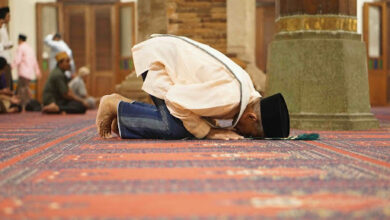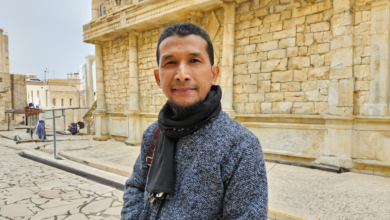Zakat Al-Fitr

DDHK.ORG - Are we obliged to pay zakat fitrah? What is the wisdom behind the obligatory zakat fitrah for every Muslim and Muslimah?
Definition
Zakat Fihri (zakat fitrah) or it is called Sadaqah Ar-Ramadan is zakat which is why it is obligatory fitr (breaking) in the month of Ramadan. Zakat fitrah is different from other zakat, because it is a burden on the person, not on property. Therefore, no specific nishab is required on zakat fitrah. Fuqaha ' also call this zakat fitrah with head zakat, servant zakat or body zakat ([1] Fiqhu Az-zakah, 2 / 929-930.)
Law and Wisdom of Zakat Fitrah
Jumhur Ulama agrees that zakat fitrah is obligatory for every Muslim who meets the requirements. The proof is the hadith narrated by Ibn Umar ra (2Al-Mausu'ah Al fiqhiyyah Al-kuwaitiyyah 23/336.):
ابن الله ا ال ل الله لى الله ليه لم اة الفطر رمضان لى الناس اعا لى ل , ل
Meaning: "Narrated from Ibn Umar ra that Rasulullah Saw. Mandatory zakat fithrah as much as one sha 'grain for every free person or servant, male or female among the Muslims. " (HR. Bukhari and Muslim.)
The mandatory requirements for Zakat Fitrah are as follows (3Al-Mausu'ah Al fiqhiyyah Al-kuwaitiyyah 23/337.):
- Jumhur Ulama agrees that zakat fitrah is not obligatory for unbelievers.
- According to the number fuqaha ' Zakat fitrah is not obligatory for the slave because they do not have anything including themselves ([1] According to hanabilah I am obliged to pay zakat fitrah according to the hadith).
- Able to pay zakat fitrah. Namely for those who have excess food at night and on the day of Eid. It's different from zakat times (property), according to Ibn Qudamah: "debt does not prevent the payment of zakat fitrah". That is, if a person has a sufficient level to pay zakat fitrah but also has a debt as much as this zakat, he is obliged to issue zakat fitrah unless the debt is due. He has to pay debts and is not obliged to pay zakat fitrah. ([1]Ulama differ on the meaning of "capable" here. According to hanafiyyah, what is meant by being able here is if someone has assets that have reached the nishab of either the nishab of gold, silver, livestock, or commerce. Meanwhile, according to Malikiyyah, zakat fitrah must be paid if someone has excess assets even though it is only 1 sha 'even obliged to be in debt to pay zakat fitrah if the person is able to pay it after that. If you can't, then you don't have to. Meanwhile, according to Syafi'iyyah and Hanabilah being able here means that someone has excess food on the night and the day of Eid, if someone needs zakat fitrah to fulfill his life then he is considered unable and not obliged to pay zakat fitrah.
When a person has met the requirements above, he is obliged to pay zakat for himself and the people he is obliged to support such as his wife, small children, or his children who are adults but have no sense (insane), because they are entitled to assets that are it has.
Zakat fitrah was first prescribed in the month of Sha'ban in the 2nd year of Hijriyyah, right in the year the fasting of Ramadan is mandatory. Among the wisdoms of zakat fitrah are being gentle and sharing happiness with the poor on Eid al-Fitr. In addition, of course, to purify ourselves and patch up our lack of fasting. Waqi 'ibn Jarrah said, "Zakat fitrah in the month of Ramadan is like prostration for sahwi in prayer, that is, completing the lack of rewards for fasting as prostration for sahwi complements prayer." (5Mausu'ah al-fiqh al-islamiy 3 / 54).
Level of Zakat Al-Fitr
The level of zakat fitrah is 1 sha ' dates, wheat, or other types of staple food of each country. Namely, in the form of rice for most of Indonesia. Dr. Yusuf Al-Qaradhawi converted 1 sha 'this is equivalent to 2,156 kilograms, but this is a scale for qamah (wheat) - ([1] Fiqh Az-zakah 2/953). In Indonesia it is usually converted to 2,5 kilograms, perhaps this opinion is more appropriate because rice is heavier than wheat ([1]1 sha 'is equivalent to 4 mud. However, this mud is a measurement in the form of volume such as liters, not weight. If the measurement is converted into unit weight (kg), of course it will vary according to the type of food being measured. 1 mud is equivalent to 812,5g according to hanafiyyah, or 510g according to quantity, so if converted 1 sha 'is equivalent to 4 × 812,5 = 3,250kg (hanafiyyah) or 4 × 510 = 2,040kg (jumhur). (Kitab Al-makayil) wal mawazin as-syar'iyyah p. 37)).
Jumhur scholars (malikiyyah, shafi'iyyah and hanabilah) argues that zakat fitrah is actually paid in the form of staple foods in the form of rice, wheat, corn, and so on. However, Hanafiyyah permitting to pay in the form of money equal to the price of the staple food, it is even better to make it easier for the poor to buy something needed on holidays ([1] Al-Mausu'ah Al fiqhiyyah Al-kuwaitiyyah, 23/344.).
Time to Pay Zakat Al-Fitr
Scholars have different opinions regarding the time a person is obliged to pay zakat fitrah. Hanafiyyah and partly Malikiyah argues that the time required to pay zakat fitrah is when the dawn of the feast day rises. Meanwhile, according to Shafi'iyyah and Hanabilah the obligatory time to pay zakat fitrah is after the sun at the end of Ramadan sets.
The above opinion implies when someone dies after the last sun of Ramadan sets. According to Shafi'iyyah, the person must be paid zakat fitrah while obeying Hanafiyyah it is not obligatory because the person has died before the time it is obligatory for him to pay zakat. As for children who are born or those who convert to Islam after the sun at the end of Ramadan sets, according to Hanafiyyah they are obliged to pay zakat fitrah because when the time is required they have met the criteria. Meanwhile, according to shafi'iyyah they are not obliged to pay zakat fitrah because when required they have not met the requirements.
[darsitek number=3 tag=”wisdom”]As for the time of payment, zakat fitrah may also be paid before the time it is required, since the beginning of the month of Ramadan, as stated in the opinion. Hanafiyyah. The scholars agree that this zakat must be paid before praying 'Ied, otherwise it is considered ordinary sunnah alms ([1]According to Syafi'iyyah, it is makruh to pay zakat fitrah after the 'Ied prayer, and it is forbidden to do it after the feast day if there is no udzur. If you postpone the payment after the holiday, it is sinful and must be diqadha '(replaced)).
ابن اس الله ال ل الله لى الله ليه لم اة الفطر للصائم اللغو الرفث المساكين, اها الا الا
Meaning: "Narrated from Ibn Abbas ra that Rasulullah Saw. obliging zakat fitrah as a purifier for people who fast from useless and haram actions, as well as food for poor people. Whoever performs it before praying 'Ied, then it is the zakat that is received. And whoever takes it out after praying 'Ied, then it is an ordinary sadaqah. " (6HR. Abu Dawood)
Asnaf and Zakat Fitrah Payment Place
The scholars differed about ashnaf zakat fitrah:
- Famous opinion of the school Shafi'i states that zakat fitrah must be paid to 8 existing asnaf, according to the word of Allah SWT in Surah At-Taubah: 60.
- Fri The scholars say that it is permissible to pay zakat fitrah to 8 asnaf, because zakat fitrah is included in the general word of Allah.
- While the school malikiyyah argues that zakat fitrah is only for the poor. This opinion is ondiligentwritten by Ibn Qayyim and Ibn Taimiyyah ([1] Fiqh Az-zakah 2/969. Al-Mausu'ah Al fiqhiyyah Al-kuwaitiyyah, 23/344).
From the 3 opinions above, it can be combined that zakat fitrah is prioritized for the poor, because the main purpose of zakat fitrah is to make ends meet and share happiness with the poor on holidays. This does not mean that it is forbidden to give it to ashnaf others when there is need or benefit.
[darsite number=3 tag=”consultation”]According to Syafi'i and Hambali, the most important place to pay zakat fitrah is where the muzakki (who issues zakat) stay and fast. However, if the muzakki is fasting Ramadan somewhere other than his original place of residence due to traveling or the like, then his zakat is paid at the place where he is fasting. Because zakat fitrah is related to the body.
Some of the scholars allowed to send the zakat to another place if the muzakki lived in the place where there were no needy and poor people or there were other reasons. Allah knows best. [Source: Contemporary Zakat Fiqh] [DDHKNews]



